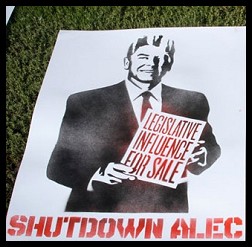 New paper ballot optical-scan computer tabulator systems used to tally millions of votes in New York --- as well as "swing states" such as Florida, Ohio and Wisconsin --- do not tally votes correctly. That stunning admission comes courtesy of a new report released by the private company which manufactures, sells, services and programs the systems which are now believed to have mistallied tens of thousands of ballots in New York in 2010.
New paper ballot optical-scan computer tabulator systems used to tally millions of votes in New York --- as well as "swing states" such as Florida, Ohio and Wisconsin --- do not tally votes correctly. That stunning admission comes courtesy of a new report released by the private company which manufactures, sells, services and programs the systems which are now believed to have mistallied tens of thousands of ballots in New York in 2010.
The votes of more than ten million voters could be affected by a newly revealed failure in the voting systems set for use in those four states in this year's Presidential election, and in more than 50 different jurisdictions in Wisconsin during next month's historic recall elections.
Election Systems & Software, Inc. (ES&S), the largest e-voting machine company in the U.S. and the maker of the paper ballot op-scan tally systems in question, have confirmed that their systems may overheat when used over several hours (for example, during an election!), and that they then may mistally and/or incorrectly discard anywhere from 30% to 70% of votes scanned by the machines.
The only way to know that a hand-marked paper ballot had been mistallied by the system would be to examine the ballots by hand to assure that the computer had read and recorded the voters' selections correctly.
The New York Daily News editorial board --- which has been persistently forcing the issue on state Election Officials who initially ignored massive mistallies discovered in the South Bronx during the state's 2010 election --- reports on ES&S' confirmation of the latest failure in a story headlined "We told you so: Newfangled voting machine screwed up". Their article today begins this way...
In fact, they can screw up voter tallies to a fare-thee-well even after technicians carefully calibrate and test them.
So state and city election officials have discovered, along with the machine's manufacturer, thanks to insistent prodding by this page.
Earlier this year, the newspaper discovered --- through public records requests for the paper ballots in a single precinct in the South Bronx --- that the ES&S model DS200 op-scan system had failed to count some 70% of paper ballots correctly in the 2010 primary election. In that November's general election, some 54% of the ballots were mistallied at the same precinct.
The result, as confirmed by ES&S, tens of thousands of perfectly valid votes may have gone uncounted, while thousands of "phantom votes" in races that voters hadn't intended to vote in at all were counted as valid votes.
The Daily News characterizes the initial response by election officials in NY, after the paper had discovered the massive failures, as "a statement of severe psychological denial."
All of the above likely sounds very familiar to long-time readers of The BRAD BLOG, where we are considering changing the name of our news site to "We Told You So: Newfangled Voting Machines Screw Up," as a tip of the hat to the NY Daily News, and to better reflect a great deal of our nearly 10 years worth of content here.
Unfortunately, the latest example of secret vote-tallying computers made by private companies failing to accurate tally our once-public elections, is not only affecting New York. Moreover, the failure isn't isolated to the ES&S model DS200 paper ballot optical-scan system. As we've reported here for years, and on a number of recent occasions over just the past few months, similar failures have been discovered in other states and on other similarly designed paper ballot optical-scan systems.
If you think that simply because you are not forced to vote on a 100% unverifiable touch-screen voting machine that your ballot will be counted and counted accurately this year, think again...


 'Mob Boss' Trump's Global Trade Sanctions Tank U.S., World Markets: 'BradCast' 4/3/25
'Mob Boss' Trump's Global Trade Sanctions Tank U.S., World Markets: 'BradCast' 4/3/25 'Green News Report' 4/1/25
'Green News Report' 4/1/25
 Dems Step Up: Crawford Landslide in WI; Booker Makes History in U.S. Senate: 'BradCast' 4/2/25
Dems Step Up: Crawford Landslide in WI; Booker Makes History in U.S. Senate: 'BradCast' 4/2/25 Judge Dismisses Long-Running Challenge to GA's Unverifiable, Insecure E-Vote System: 'BradCast' 4/1/25
Judge Dismisses Long-Running Challenge to GA's Unverifiable, Insecure E-Vote System: 'BradCast' 4/1/25 'Green News Report' 4/1/25
'Green News Report' 4/1/25 Bad Court and Election News for Trump is Good News for America: 'BradCast' 3/31/25
Bad Court and Election News for Trump is Good News for America: 'BradCast' 3/31/25 Sunday 'Great Start!' Toons
Sunday 'Great Start!' Toons Vets Push Back at Trump, Musk Plan to Slash Health Care, 80K V.A. Jobs: 'BradCast' 3/27/25
Vets Push Back at Trump, Musk Plan to Slash Health Care, 80K V.A. Jobs: 'BradCast' 3/27/25 'Green News Report' 3/27/25
'Green News Report' 3/27/25 Signal Scandal Worsens for Trump, GOP; Big Dem Election Wins in PA: 'BradCast' 3/26
Signal Scandal Worsens for Trump, GOP; Big Dem Election Wins in PA: 'BradCast' 3/26 'Emptywheel' on Why Trump NatSec Team Should 'Resign in Disgrace' After Signal Chat Debacle: 'BradCast' 3/25/25
'Emptywheel' on Why Trump NatSec Team Should 'Resign in Disgrace' After Signal Chat Debacle: 'BradCast' 3/25/25 'Green News Report' 3/25/25
'Green News Report' 3/25/25 USPS 'Belongs to the People, Not the Billionaires': 'BradCast' 3/24/25
USPS 'Belongs to the People, Not the Billionaires': 'BradCast' 3/24/25 Sunday 'Suddenly Conceivable' Toons
Sunday 'Suddenly Conceivable' Toons 'Green News Report' 3/20/25
'Green News Report' 3/20/25 We're ALL Voice of America Now: 'BradCast' 3/20/25
We're ALL Voice of America Now: 'BradCast' 3/20/25 What Trump's 'Timber Production Expansion' Means (and Costs): 'BradCast' 3/19/25
What Trump's 'Timber Production Expansion' Means (and Costs): 'BradCast' 3/19/25 Courts Largely Holding Against Trump, Musk Lawlessness: 'BradCast' 3/18/25
Courts Largely Holding Against Trump, Musk Lawlessness: 'BradCast' 3/18/25 Chief VOA Reporter on Outlet Falling Silent First Time Since 1942: 'BradCast' 3/17/25
Chief VOA Reporter on Outlet Falling Silent First Time Since 1942: 'BradCast' 3/17/25 Trump EPA Unveils Plans to Endanger, Sicken Americans: 'BradCast' 3/13/25
Trump EPA Unveils Plans to Endanger, Sicken Americans: 'BradCast' 3/13/25 Trump Nixed Enforce-ment Against 100 Corp. Lawbreakers: 'BradCast' 3/12/25
Trump Nixed Enforce-ment Against 100 Corp. Lawbreakers: 'BradCast' 3/12/25 Bad Day for 'Strongmen': 'BradCast' 3/11
Bad Day for 'Strongmen': 'BradCast' 3/11 WI Election Could Flip Supreme Court Control, Musk Jumps In: 'BradCast' 3/10
WI Election Could Flip Supreme Court Control, Musk Jumps In: 'BradCast' 3/10
 VA GOP VOTER REG FRAUDSTER OFF HOOK
VA GOP VOTER REG FRAUDSTER OFF HOOK Criminal GOP Voter Registration Fraud Probe Expanding in VA
Criminal GOP Voter Registration Fraud Probe Expanding in VA DOJ PROBE SOUGHT AFTER VA ARREST
DOJ PROBE SOUGHT AFTER VA ARREST Arrest in VA: GOP Voter Reg Scandal Widens
Arrest in VA: GOP Voter Reg Scandal Widens ALL TOGETHER: ROVE, SPROUL, KOCHS, RNC
ALL TOGETHER: ROVE, SPROUL, KOCHS, RNC LATimes: RNC's 'Fired' Sproul Working for Repubs in 'as Many as 30 States'
LATimes: RNC's 'Fired' Sproul Working for Repubs in 'as Many as 30 States' 'Fired' Sproul Group 'Cloned', Still Working for Republicans in At Least 10 States
'Fired' Sproul Group 'Cloned', Still Working for Republicans in At Least 10 States FINALLY: FOX ON GOP REG FRAUD SCANDAL
FINALLY: FOX ON GOP REG FRAUD SCANDAL COLORADO FOLLOWS FLORIDA WITH GOP CRIMINAL INVESTIGATION
COLORADO FOLLOWS FLORIDA WITH GOP CRIMINAL INVESTIGATION CRIMINAL PROBE LAUNCHED INTO GOP VOTER REGISTRATION FRAUD SCANDAL IN FL
CRIMINAL PROBE LAUNCHED INTO GOP VOTER REGISTRATION FRAUD SCANDAL IN FL Brad Breaks PA Photo ID & GOP Registration Fraud Scandal News on Hartmann TV
Brad Breaks PA Photo ID & GOP Registration Fraud Scandal News on Hartmann TV  CAUGHT ON TAPE: COORDINATED NATIONWIDE GOP VOTER REG SCAM
CAUGHT ON TAPE: COORDINATED NATIONWIDE GOP VOTER REG SCAM CRIMINAL ELECTION FRAUD COMPLAINT FILED AGAINST GOP 'FRAUD' FIRM
CRIMINAL ELECTION FRAUD COMPLAINT FILED AGAINST GOP 'FRAUD' FIRM RICK SCOTT GETS ROLLED IN GOP REGISTRATION FRAUD SCANDAL
RICK SCOTT GETS ROLLED IN GOP REGISTRATION FRAUD SCANDAL VIDEO: Brad Breaks GOP Reg Fraud Scandal on Hartmann TV
VIDEO: Brad Breaks GOP Reg Fraud Scandal on Hartmann TV RNC FIRES NATIONAL VOTER REGISTRATION FIRM FOR FRAUD
RNC FIRES NATIONAL VOTER REGISTRATION FIRM FOR FRAUD EXCLUSIVE: Intvw w/ FL Official Who First Discovered GOP Reg Fraud
EXCLUSIVE: Intvw w/ FL Official Who First Discovered GOP Reg Fraud GOP REGISTRATION FRAUD FOUND IN FL
GOP REGISTRATION FRAUD FOUND IN FL



















 Wisconsin's Republican Gov. Scott Walker has insisted, publicly and consistently, since the incredibly contentious introduction and eventual passage of his "Budget Repair" legislation early last year, that the need to remove collective-bargaining rights from public sector union workers was necessary only for balancing his state's alleged budgetary woes. It had absolutely nothing to do with breaking the unions, he said time and again, only with balancing the budget.
Wisconsin's Republican Gov. Scott Walker has insisted, publicly and consistently, since the incredibly contentious introduction and eventual passage of his "Budget Repair" legislation early last year, that the need to remove collective-bargaining rights from public sector union workers was necessary only for balancing his state's alleged budgetary woes. It had absolutely nothing to do with breaking the unions, he said time and again, only with balancing the budget. Good news for democracy. Bad news for the GOP deceivers and the billionaire sociopaths, like the Koch brothers, who fund them. Missouri's courts have shown that their state's nickname, "The Show-Me State," is apropos.
Good news for democracy. Bad news for the GOP deceivers and the billionaire sociopaths, like the Koch brothers, who fund them. Missouri's courts have shown that their state's nickname, "The Show-Me State," is apropos. 92-year old Viviette Applewhite, 59-year old Wilola Shinholster Lee, 72-year old Grover Freeland, 86-year old Dorothy Barksdale and 93-year old Bea Booker are just a few of the Pennsylvania residents and long-time legal voters now fighting to retain their right to vote under the state GOP's new polling place Photo ID restrictions, according to a new lawsuit filed this week in the Keystone State.
92-year old Viviette Applewhite, 59-year old Wilola Shinholster Lee, 72-year old Grover Freeland, 86-year old Dorothy Barksdale and 93-year old Bea Booker are just a few of the Pennsylvania residents and long-time legal voters now fighting to retain their right to vote under the state GOP's new polling place Photo ID restrictions, according to a new lawsuit filed this week in the Keystone State. There have been a few pieces of noteworthy news out of Wisconsin over the last few days in advance of their recall election primaries on May 8th (one week from Tuesday) and the recall general elections on June 5th. Some is largely positive for fans of democracy, but some of it, however, is both puzzling and a bit disturbing.
There have been a few pieces of noteworthy news out of Wisconsin over the last few days in advance of their recall election primaries on May 8th (one week from Tuesday) and the recall general elections on June 5th. Some is largely positive for fans of democracy, but some of it, however, is both puzzling and a bit disturbing. Several weeks ago we told you that Kathy Nickolaus, the controversial and oft-failed County Clerk of Waukesha County, WI, was
Several weeks ago we told you that Kathy Nickolaus, the controversial and oft-failed County Clerk of Waukesha County, WI, was  On Monday, the Wisconsin Supreme Court issued two one-sentence orders declining to hear both appeals filed by Republican state Attorney General J.B. Van Hollen in two different polling place Photo ID cases. In both, judges in lower courts had blocked the controversial voting rights restrictions passed by Republicans last year, finding that the law violated the state Constitution's guaranteed right to vote.
On Monday, the Wisconsin Supreme Court issued two one-sentence orders declining to hear both appeals filed by Republican state Attorney General J.B. Van Hollen in two different polling place Photo ID cases. In both, judges in lower courts had blocked the controversial voting rights restrictions passed by Republicans last year, finding that the law violated the state Constitution's guaranteed right to vote. We're back tonight guest-hosting the nationally-syndicated
We're back tonight guest-hosting the nationally-syndicated  Waukesha County's oft-failed election administrator, Kathy Nickolaus will not participate in the upcoming recall elections for Gov. Scott Walker, Lt. Gov. Rebecca Kleefisch and four Republican state Senators.
Waukesha County's oft-failed election administrator, Kathy Nickolaus will not participate in the upcoming recall elections for Gov. Scott Walker, Lt. Gov. Rebecca Kleefisch and four Republican state Senators. Today on
Today on  During yesterday's Wisconsin primary election, a number of paper ballots were sent out in several counties that were reportedly too wide to be tabulated by the computerized optical-scan systems used to tally ballots in the state. The same exact thing happened just
During yesterday's Wisconsin primary election, a number of paper ballots were sent out in several counties that were reportedly too wide to be tabulated by the computerized optical-scan systems used to tally ballots in the state. The same exact thing happened just  The War for Wisconsin continues.
The War for Wisconsin continues. A public hand-count of paper ballots in Palm Beach County, FL over the weekend has decisively determined the winners and losers of several disputed elections after paper ballot optical-scan computer tallying systems made by Sequoia Voting Systems (now owned by Dominion Voting) declared the incorrect "winners" of several races in a March 13th election.
A public hand-count of paper ballots in Palm Beach County, FL over the weekend has decisively determined the winners and losers of several disputed elections after paper ballot optical-scan computer tallying systems made by Sequoia Voting Systems (now owned by Dominion Voting) declared the incorrect "winners" of several races in a March 13th election. Our own crack
Our own crack  Out of scores of journalists who work for the Gannett Wisconsin Media-owned Green Bay Press-Gazette, just seven were willing to offer their personal, non-business related support for a recall of Wisconsin's controversial Gov. Scott Walker. They are now being disciplined.
Out of scores of journalists who work for the Gannett Wisconsin Media-owned Green Bay Press-Gazette, just seven were willing to offer their personal, non-business related support for a recall of Wisconsin's controversial Gov. Scott Walker. They are now being disciplined.













